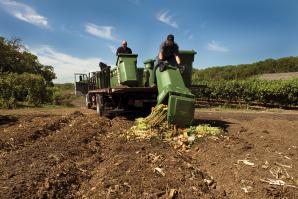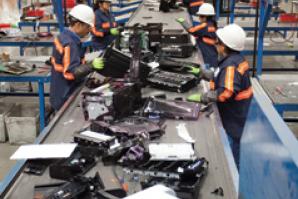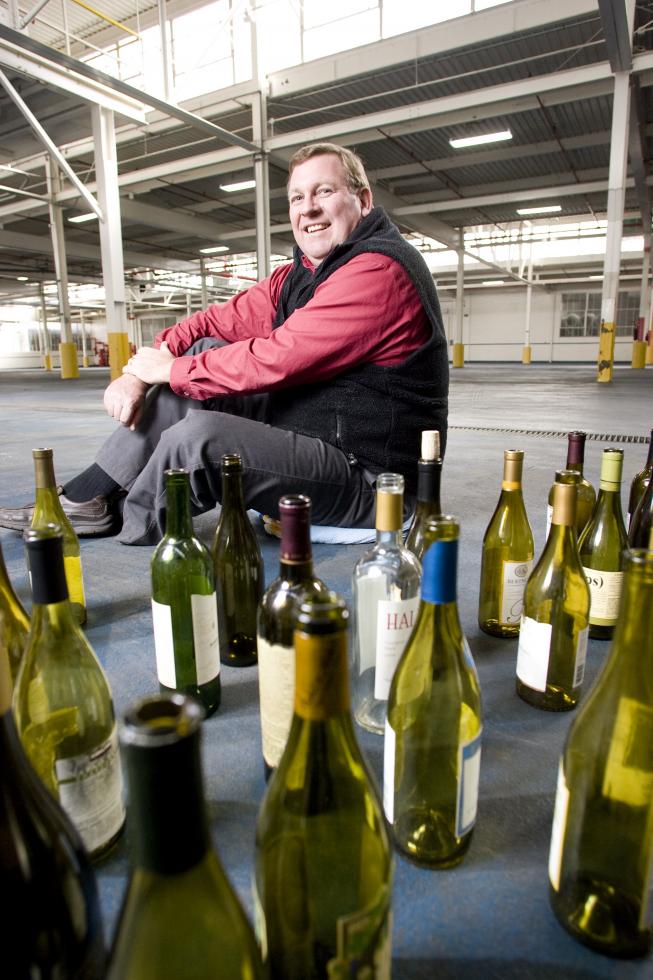Bruce Stephens might be on to something. And if his estimates — and the optimism and faith of dozens of investors — prove accurate, his wine bottle washing company could provide a hefty return on investment, dozens of Stockton jobs and low-cost wine bottles for environment and budget-â?¨conscious wineries.
Wine Bottle Recycling LLC is scheduled to start business this summer in Stockton’s old 82,000-square-foot Del Monte fruit packaging plant. Nearly 20 employees will be hired initially to remove labels, wash, sterilize, dry, package and ship used bottles to wine producers across the state. Within five years, Stephens says he wants to employ more than 60 workers.
Most beverage containers these days are recycled, not reused. The change took place in the 1970s and had much to do with the types of packaging taking over market share. That spawned a recycling industry, California Redemption Value fees and a shift in the way society used and viewed packaging, says Mark Oldfield, spokesman for the California Department of Resources Recycling and Recovery.
It’s a situation that has plagued Stephens so greatly that he decided to do something about it. “I poked my wife awake at 2 a.m. and said ‘How come nobody is washing bottles?’ There is a lot of bottle reuse in Germany and France, but why not here?”
That question led the 15-year home-winemaker to Europe where the average wine bottle is reused nearly a dozen times. He toured washing facilities, read the fine print about label glue laws and purchased some used equipment to get started on the same path stateside.
Washing, sanitizing and reusing wine bottles has been attempted in the United States but has been unsuccessful for a number of reasons, including the difficulty of removing label glue.
On top of that, there has been little, if any, incentive for consumers to either reuse or purchase reused glass products in California, Oldfield says.
By washing and recycling, Stephen’s company will be able to provide wineries with bottles that cost 20 percent to 50 percent less than the cost of new ones. It’s a viable financial endeavor, Stephens says, because the wholesale price of bottles is nearly double the price it was a decade ago.
And while dozens of such ventures have failed in the past, Stephens is certain the timing for his $4 million company’s market entry is prime for turning the trend.
“The sorting is tricky. For that, we found a company that manufactured facial recognition software that can identify the bottles exact to manufacturers’ skew,” Stephens says. “There are 500 different styles of bottles. We’re not going to be able to handle that. But we are going to be able to handle the top 75 types, which really cover 80 percent of the bottles on the market.”
Competition, he says, has been largely hindered by the inability to sort the bottles and remove the labels. In Europe, all the bottles have to have a label that can be removed by a bottle washer, but that rule doesn’t exist in the U.S.
“Back in 1995, they were still labeling wine with paper labels and not too strong a glue. However, in about 1997, somebody got it in their mind that they didn’t want their labels to fall off in the ice bucket, so they went to the adhesive manufacturer and came up with what they call ice-proof glue. And then they started using heavier and heavier papers and multilaminant paper with plastics on them,” says Wine Bottle Recycling COO Chris Ronson.
Ronson originally launched his own million-dollar wine bottle reuse company, Evergreen, in 1995 with a massive collection of used bottles from recycling facilities.
“The concept is real and it works,” he says, “but we were ahead of our time.”
There was a grip of death on the glue. Ronson’s crew would stand around in steel gloves scraping labels off by hand with razor blades. Whatever profit Evergreen would have had dissolved in the process.
But Wine Bottle Recycling has developed a proprietary method for removing those horrendous labels.
The last major piece of the puzzle — and it’s a doozie — is customer acceptance. Evergreen failed because no one would buy the product.
One of the most glaring problems was that, contrary to the company’s market research, consumers were skeptical about used bottles, Ronson says.
“Apparently no one remembered drinking out of milk bottles as kids … but today’s environmental psychological movement is so significant that people are now standing in line for these bottles,” he says.
Still, Stephens is exercising caution. Wine Bottle Recycling will ramp up slowly in the first year, washing and selling fewer than 100,000 cases. But by the end of the fifth year, Stephens anticipates handling up to 5 million cases a year, “which is still only 1 percent of California’s bottles,” he says. “We’ve pretty much got the first year sold.”
California wineries produce about 300 million cases of wine a year -— that’s 3.6 billion bottles — well more than half of which are produced in San Joaquin County alone.
A number of the region’s large wineries have stepped up both as potential consumers and as investment partners. Jackson Family Wines, for one, is making a minority investment in the venture, though the company would not disclose it’s financial participation.
“Glass is a significant source of energy consumption in the production of wine. So as a responsible business in this day and age, if we can use a higher percentage of recycled products, that’s important,” says Lenny Stein, president of Jackson Family Enterprises. “We have, in sourcing glass for our wines, a significant priority to encourage our glass suppliers to maximize the use of recycled glass in the fabrication of new bottles. To us, this [partnership] is a logical extension.”
Other business and investment partners include Napa County Supervisor Bill Dodd, who is serving as the president of the company; Napa Recycling, California Waste Recovery Systems in Lodi, Sutter Home Family Vineyards and BLT Enterprises of Sacramento.
“It’s great to come back and prove that our concept was right to start with,” Ronson says. “All the issues that stood in our way have been mitigated, and not only that, we have wineries as partners, and that tells you right there about the acceptance level. We’re starting ahead of the curve.”
Recommended For You

Trash & Prizes
Recycling programs keep cash in company pockets
Nowadays it’s not only hip for a business to go green, it’s the law. The state of California as well as some Capital Region jurisdictions have ordinances mandating recycling.

Tech Trash
How to dispose your out-of-date computers and e-waste
If your IT room is starting to look like a scene out of “Sanford and Son,” you’re not alone. In 2010, American consumers and businesses unloaded 40 million computers onto recyclers, landfills and the refurbished market, the Golisano Institute for Sustainability in Rochester, N.Y., reports. Some estimates show, however, that millions more are idling in homes and offices because owners simply don’t know what to do with them.



